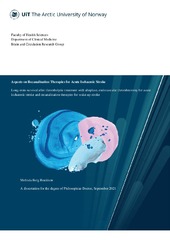| dc.contributor.advisor | Mathiesen, Ellisiv | |
| dc.contributor.author | Roaldsen, Melinda Berg | |
| dc.date.accessioned | 2022-01-04T09:49:59Z | |
| dc.date.available | 2022-01-04T09:49:59Z | |
| dc.date.issued | 2022-01-21 | |
| dc.description.abstract | Stroke is a leading cause of death and disability worldwide. Approximately 85% of strokes are ischaemic strokes caused by blockage of a brain artery. Recanalisation therapies with thrombolysis (injection of drugs that dissolve the blood clot) and thrombectomy (mechanical removal of the blood clot) have revolutionised acute ischaemic stroke treatment during the last 25 years.
Thrombolysis within 4.5 hours after stroke improves functional outcome in acute ischaemic stroke patients after 3 to 6 months, but less is known about the effect on long-term survival. We assessed the effect of thrombolysis on long-term survival up to 3 years after ischaemic stroke in a multicentre, randomised controlled trial. We found a non-significant lower death rate after 3 years. Mortality was higher in the thrombolysis group in the first seven days due to intracerebral haemorrhage, while patients who survived the first week had significantly higher long-term survival.
In a systematic review of previous trials, we assessed the effect of thrombectomy and/or intra-arterial thrombolysis in patients with acute ischaemic stroke. Thrombectomy and/or intra-arterial thrombolysis increased the chance of achieving a good functional outcome and also reduced the risk of death without increasing the risk of symptomatic intracranial haemorrhage.
In about 20% of ischaemic stroke, the stroke occurs during sleep (wake-up stroke). To assess the safety and efficacy of recanalisation therapies in wake-up stroke patients, we conducted a systematic review of previous trials on such treatments in this patient group. The results showed that recanalisation therapies improved functional outcome and survival in selected patients with wake-up stroke.
We are currently studying the effect of thrombolysis with tenecteplase in wake-up stroke patients in a multicenter trial. The design and methods for this trial are presented. If thrombolytic treatment benefit wake-up stroke patients, this can lead to improved stroke treatment for a large proportion of stroke patients. | en_US |
| dc.description.doctoraltype | ph.d. | en_US |
| dc.description.popularabstract | We have studied the effect of recanalisation therapies (blood clot dissolving medication and mechanical removal of blood clots) in stroke caused by a blood clot. In a study on survival after stroke, we found that thrombolysed patients had a slightly lower death rate after 3 years. Thrombolysis increased the risk of death in the first week, but those who survived the first week had higher long-term survival.
In a systematic review of previous trials, we found that mechanical blood clot removal increased good functional outcome and reduced the risk of death after stroke.
In another review, we found that recanalisation therapies, especially mechanical removal of blood clots, improved function and survival in selected patients who get a stroke during sleep (wake-up stroke).
We are currently conducting a trial of blood clot dissolving medication in wake-up stroke patients. If this is shown to benefit wake-up stroke patients, more patients will be able to receive acute treatment. | en_US |
| dc.description.sponsorship | Nasjonalforeningen for folkehelsen | en_US |
| dc.identifier.uri | https://hdl.handle.net/10037/23590 | |
| dc.language.iso | eng | en_US |
| dc.publisher | UiT The Arctic University of Norway | en_US |
| dc.publisher | UiT Norges arktiske universitet | en_US |
| dc.relation.haspart | <p>Paper I: Berge, E., Cohen, G., Roaldsen, M.B., Lundström, E., Isaksson, E., Rudberg, A.-S., … Whiteley, W.N. (2016). Effects of alteplase on survival after ischaemic stroke (IST-3): 3-year follow-up of a randomised, controlled, open-label trial. <i>Lancet Neurology, 15</i>(10), 1028-1034. Also available at <a href=https://doi.org/10.1016/S1474-4422(16)30139-9>https://doi.org/10.1016/S1474-4422(16)30139-9</a>.
<p>Paper II: Roaldsen, M.B., Jusufovic, M., Berge, E. & Lindekleiv, H. (2021). Endovascular thrombectomy and intra‐arterial interventions for acute ischaemic stroke. <i>Cochrane Database of Systematic Reviews, 6</i>, CD007574. Also available at <a href=https://doi.org/10.1002/14651858.CD007574.pub3>https://doi.org/10.1002/14651858.CD007574.pub3</a>.
<p>Paper III: Roaldsen, M.B., Lindekleiv, H. & Mathiesen, E.B. (2021). Intravenous thrombolytic treatment and endovascular thrombectomy for ischaemic wake-up stroke. (Submitted manuscript). Now published in <i>Cochrane Database of Systematic Reviews, 12</i>, CD010995, available at <a href=https://doi.org/10.1002/14651858.CD010995.pub3>https://doi.org/10.1002/14651858.CD010995.pub3</a>.
<p>Paper IV: Roaldsen, M.B., Lindekleiv, H., Eltoft, A., Jusufovic, M., Søyland, M.-H., Petersson, J., … Berge, E. (2021). Tenecteplase in wake-up ischaemic stroke trial (TWIST): Protocol for a randomised controlled trial. <i>International Journal of Stroke, 16</i>(8), 990-994. Also available in Munin at <a href=https://hdl.handle.net/10037/21711>https://hdl.handle.net/10037/21711</a>. | en_US |
| dc.rights.accessRights | openAccess | en_US |
| dc.rights.holder | Copyright 2022 The Author(s) | |
| dc.subject.courseID | DOKTOR-003 | |
| dc.subject | VDP::Medisinske Fag: 700::Klinisk medisinske fag: 750::Nevrologi: 752 | en_US |
| dc.subject | VDP::Medical disciplines: 700::Clinical medical disciplines: 750::Neurology: 752 | en_US |
| dc.title | Aspects on Recanalisation Therapies for Acute Ischaemic Stroke. Long-term survival after thrombolytic treatment with alteplase, endovascular thrombectomy for acute ischaemic stroke and recanalisation therapies for wake-up stroke | en_US |
| dc.type | Doctoral thesis | en_US |
| dc.type | Doktorgradsavhandling | en_US |


 English
English norsk
norsk